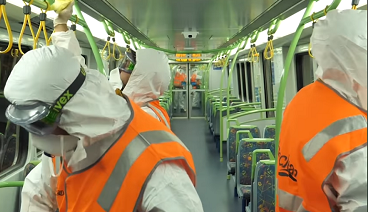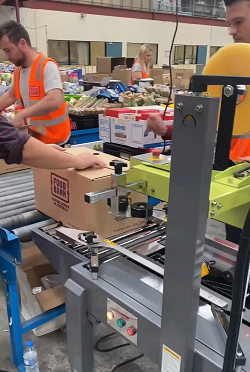The Australian Alert Service is the weekly publication of the Australian Citizens Party.
It will keep you updated of strategic events both in Australia, and worldwide, as well as the organising activities of the Citizens Party.
To subscribe to the Australian Alert Service, it's easy, and it's secure.
Click here for subscriptions within Australia
Click here for overseas subscriptions
Lead Editorial
25 March 2020
Vol. 22. No. 12
Some economic analysts and commentators are acting as if there’s a kind of “Sophie’s choice”, or at the very least a trade-off, between saving the economy or the people, but the economy is the people. What those pundits are actually worried about is saving the financial bubble which should simply be left to deflate.
Viewed clearly, we have the imperative to re-deploy the nation and its resources to the things it should always have been engaged in—building the nation’s ability to feed itself, keep itself healthy, housed and employed in productive activity. Yes, it will happen under incredibly difficult conditions, but we have no choice. It often takes a shock to the system to shift deeply entrenched political, economic and cultural dynamics.
Suddenly we have a Minister for Industry, Science and Technology, Karen Andrews, working with business and industry across the country to launch a manufacturing blitz. Hundreds of companies have volunteered to make masks and other protective gear, hand sanitiser and thermometers. Speaking during Parliament’s single sitting day on 23 March, Labor MP and former opposition leader Bill Shorten declared that he has been inundated with offers from manufacturers who have the capability and capacity to build urgently required equipment such as ventilators. Greens leader Adam Bandt also endorsed the proposal to “start manufacturing them right here ourselves”.
Many people who have lost their jobs can be employed in these enterprises. The Victorian government has started putting people to work cleaning public transport and preparing food packages for people in quarantine. The Federal government is hiring up to 5,000 new staff to work at Centrelink to handle demand. They should cut all the red tape and hire the people queueing up outside! This is how things are done in war, as you can see in this week’s Almanac on how BHP boss Essington Lewis transformed Australian industry during World War II. A private businessman appointed as Director-General of Munitions, he was granted extraordinary powers—to spend large sums of money without ministerial approval, to acquire land, bypass tender processes or even delegate his power, to build the capability to defend a nation under threat.
ResMed, originally an Australian medical equipment company now based in California, has facilities in Melbourne which will produce 1,000 ventilators, and Chief Scientist Alan Finkel has been charged with coordinating local production for a total of 5,000 machines. There is much more to be done and it must be done fast. We need to put people to work immediately building new hospitals, using existing buildings where possible, or we will soon be setting them up in tents like Spain.
Even former PM Tony Abbott, who gave the car industry its death sentence, is now declaring that this crisis has exposed the flaws of globalisation and our lack of self-reliance.
It remained for One Nation Senator Malcolm Roberts to put forward the most critical measure which would transform all necessary proposals into reality: national credit. He called for a people’s bank, to fund “nation-building schemes to create new productive capacity to power this nation to a future”.
This echoes Prime Minister Ben Chifley, who in 1947 tried to make the credit-creation of the “war economy” permanent. He demanded a new financial mechanism “appropriate to the needs of our rapidly growing economy”. Expanding infrastructure and a larger economy, “working at high levels of technique and productivity” with “new forms of enterprise, new methods of production, and new uses of resources” must be anticipated by the banking system.
Australians—whether leaders or ordinary citizens—are now being called upon to rise to the occasion and take leadership. It is more important than ever to strengthen the political process initiated by the fights against bail-in and the cash ban. Every citizen’s personal participation in forging the destiny of the nation is our most powerful weapon against the health and economic threat.
In this issue:
- The decisive financial and economic response to COVID-19
- Mobilise the nation to defeat public health emergency!
- Reality starts to infect Parliament—will it spread … and last?
- Australians are worried about their bank deposits
- Airlines begging for bailouts blew billions on share buybacks
- Time to end Malthusian economics
- No more bank bailouts—send them packing!
- Crisis puts Corbyn policies at centre-stage
- A moment of great opportunity, or tragedy
- Report from Italy: On the brink
- We must direct the national survival mobilisation
- Hyperinflation in Germany, 1921-23
- ALMANAC: How Essington Lewis pulled off an industrial miracle
Click here for the archive of previous issues of the Australian Alert Service









